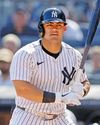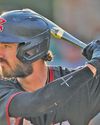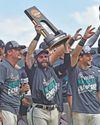
For decades, there were college coaches and pro coaches and the two groups rarely crossed over. Jobs as pro coaches were reserved for ex-pro players.
College coaches were a mix of ex-pros and everyone else.
And there was a hierarchy. There were travel team coaches and high school coaches, then junior college coaches, small college coaches, Division I coaches, minor league coaches and finally, major league coaches.
Sometimes a coach could skip a step or two on their climb up the ladder, but there were clear delineations. A junior college coach could realistically hope to jump to a four-year college, but the gap between college ball and pro ball was a nearly unbridgeable canyon.
And then the Astros decided to change everything. When Jeff Luhnow took over as Houston’s general manager, his regime soon turned over almost the entire minor league coaching staff, deciding that there was value in hiring young, hungry coaches who were tech-savvy and receptive to new ideas.
Soon, other teams followed. Junior college assistant coaches whose hope a decade ago would have been to grind their way to a role with a larger college team had been presented opportunities that seemed almost unthinkable. One year, they were working for a JUCO program. The next year, they were making significantly more in pro ball.
And that is not only changing pro ball. It’s creating seismic shifts at the junior college level. Around the country, there are programs that now lose coaches every year.
During the lead-up to the 2019 season, Central Florida JC head coach Marty Smith lost two assistant coaches to pro ball. While happy for his coaches—one of whom was his own son—he also worried at how difficult it would be to replace them.
Diese Geschichte stammt aus der February - March 2020-Ausgabe von Baseball America.
Starten Sie Ihre 7-tägige kostenlose Testversion von Magzter GOLD, um auf Tausende kuratierte Premium-Storys sowie über 8.000 Zeitschriften und Zeitungen zuzugreifen.
Bereits Abonnent ? Anmelden
Diese Geschichte stammt aus der February - March 2020-Ausgabe von Baseball America.
Starten Sie Ihre 7-tägige kostenlose Testversion von Magzter GOLD, um auf Tausende kuratierte Premium-Storys sowie über 8.000 Zeitschriften und Zeitungen zuzugreifen.
Bereits Abonnent? Anmelden

THE SERVICE TIME CONUNDRUM
MLB’s byzantine service time rules cloud rookie status and now PPI eligibility

LUIS TIANT WAS MLB'S MOST SUCCESSFUL CUBAN PITCHER
On a scouting trip to Cuba in 1957, Bobby Avila discovered 16-year-old righthander Luis Tiant on the island's Juvenile League all-star team.

ORGANIZATION REPORT
Outfielder Heston Kjerstad's career has been unique, to say the least.

TOP 10 NL EAST
From the moment Thomas White stepped on a high school mound, he was viewed as the top lefthander available in the 2023 draft.

PREPARATION PAYS OFF
lowa politician J.D. Scholten makes a surprising return to pro ball at age 44

MAKING THE GRADE
Assessing the future value of graduated National League prospects

TOP 10 NL WEST
Even in high school, Bryce Eldridge could hit the ball a mile. The 6-foot-7 righthander could also touch 96 mph off the mound.

Wood Has Towering Upside- Nationals rookie James Wood also stands 6-foot-7 and also has game-changing power.
Aaron Judge and Oneil Cruz are 6-foot7 sluggers who stand out for their power in this year’s MLB Best Tools voting. Wood spent half of this season with Triple-A Rochester before making his MLB debut on July 1. While he was in the International League, he captured managers’ attention. Wood unanimously won Best Power Prospect and also claimed Most Exciting Player in a survey of league skippers. Wood hit .353/.463/.595 with 10 home runs in 52 games for Rochester. His .242 isolated slugging was the best for a player 21 or younger at Triple-A this season.

ROAD BLOCK?
Scholarship expansion puts mid-majors at a major disadvantage on the road to Omaha

ROYALS REVIVAL
A revamped and rejuvenated farm system has Kansas City ready to rebound